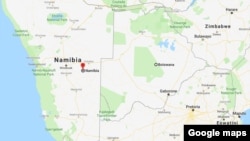The first group of more than 800 Namibian refugees was deported Tuesday from Botswana, after resisting calls for voluntary repatriation. The refugees fled their home country in 1999, following a secessionist uprising. The migrants had refused to return home citing fears of persecution from Namibian authorities.
In the morning hours, 94 refugees, including a one-year-old child, were transported back home.
The more than 800 refugees are being forced to return home after they declined pleas for voluntary repatriation from the Botswana and Namibian governments.
A spokesperson for the refugees, Felix Kakula, says despite the deportations, they will not be silenced and will continue to advocate for a separate state.
"At the event that we are deported back to Namibia, they should inform the Namibian government that people who are being deported are members of the United Democratic Party, such that they should open their prisons and lock us in, because we are not going to keep quiet when we are there," Kakula said.
Most refugees are members of the secessionist party, the United Democratic Party, which remains banned in Namibia.
Kakula, together with other Namibian refugees, were declared illegal immigrants after they refused to register for voluntary repatriation at the end of August.
One refugee, who requested anonymity, says the homes they left two decades ago have been destroyed.
"We do not have a place to call home since we have been away from home for the past two decades. Those homes that we had are not there anymore."
She says some of the students, who were born in Botswana and have never been to Namibia, had their studies disrupted at a time they were preparing for examinations in October.
"We were not given anything, without any paper transfers for the children, anything concerning their future education. And you can imagine the children who were not given anything, the children who were born here in Botswana. They are treated like foreigners, and they are supposed to go to school. Others were to write [examinations]," she said.
Human rights group Ditshwanelo has called for dialogue on the matter, particularly on the plight of children who were removed from schools. But efforts to engage both governments has hit a snag.
The Namibian government has said it is safe for the refugees to return, but it has vowed to deal with those who identify themselves as separatists.




